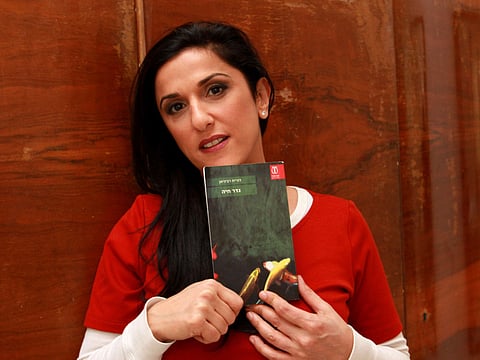Israel rejects books on Jew-Palestinian love in school curriculum
Rejection has created an uproar with critics accusing the government of censorship

Occupied Jerusalem: The Israeli regime has refused to include a novel about a love affair between a Jewish woman and a Palestinian man in the country’s high school curriculum, reportedly over concerns that it could encourage intermarriage between Jews and non-Jews.
The rejection of “Borderlife,” a novel published last year, created an uproar in Israel, with critics accusing the government of censorship.
The incident was first reported by the Haaretz daily and confirmed in a statement by the Education Ministry to The Associated Press on Thursday.
The ministry told the AP that a panel had debated adding the book “Borderlife” to the high school reading curriculum but decided against it. Israeli media said teachers had requested its inclusion on the student reading lists.
Earlier, Haaretz cited a letter by ministry official Dalia Fenig, who wrote that the book, which this year received Israel’s prestigious Bernstein literary prize, was excluded because its content was deemed unfit for high school students.
“Adolescent youth tend to romanticise and don’t have, in many cases, the systematic point of view that includes considerations about preserving the identity of the nation and the significance of assimilation,” Fenig was quoted as writing in the letter.
The Israeli high school curriculum includes books on a variety of hot-button issues, including “Khirbet Khizeh,” a 1949 novel about the expulsion of Palestinians from a fictional village by Israeli soldiers, and “A Trumpet in the Wadi,” a 1987 novel about a love affair between a Jewish man and a Christian Palestinian woman. The author of “Borderlife,” Dorit Rabinyan, has another work on the list.
In an interview with Army Radio, Fenig said having another book on the list that deals with relationships between Jews and non-Jews was a reason “Borderlife” was excluded.
The ministry’s decision comes after Israeli Cabinet ministers gave a preliminary approval this week to a bill that imposes new disclosure requirements on nonprofit groups that receive foreign funding. Since the restrictions would apply mostly to liberal nonprofits, the bill drew accusations that the government was trying to crack down on critics.
Earlier this year, Israel’s culture minister froze funding for a Palestinian theatre in Haifa over the staging of a controversial play, eliciting criticism that she was impinging on freedom of expression.
Authors and politicians reacted angrily to the rejection of “Borderlife.”
Opposition legislator Ksenia Svetlova said the decision was “sickening” while A.B. Yehoshua, one of Israel’s most famous authors, told Haaretz it was akin to “rejecting dozens of books, stories, plays and movies that each tried in their way to deal realistically with the complicated relationship between us and the minority that lives among us and under our occupation.”
Sign up for the Daily Briefing
Get the latest news and updates straight to your inbox



